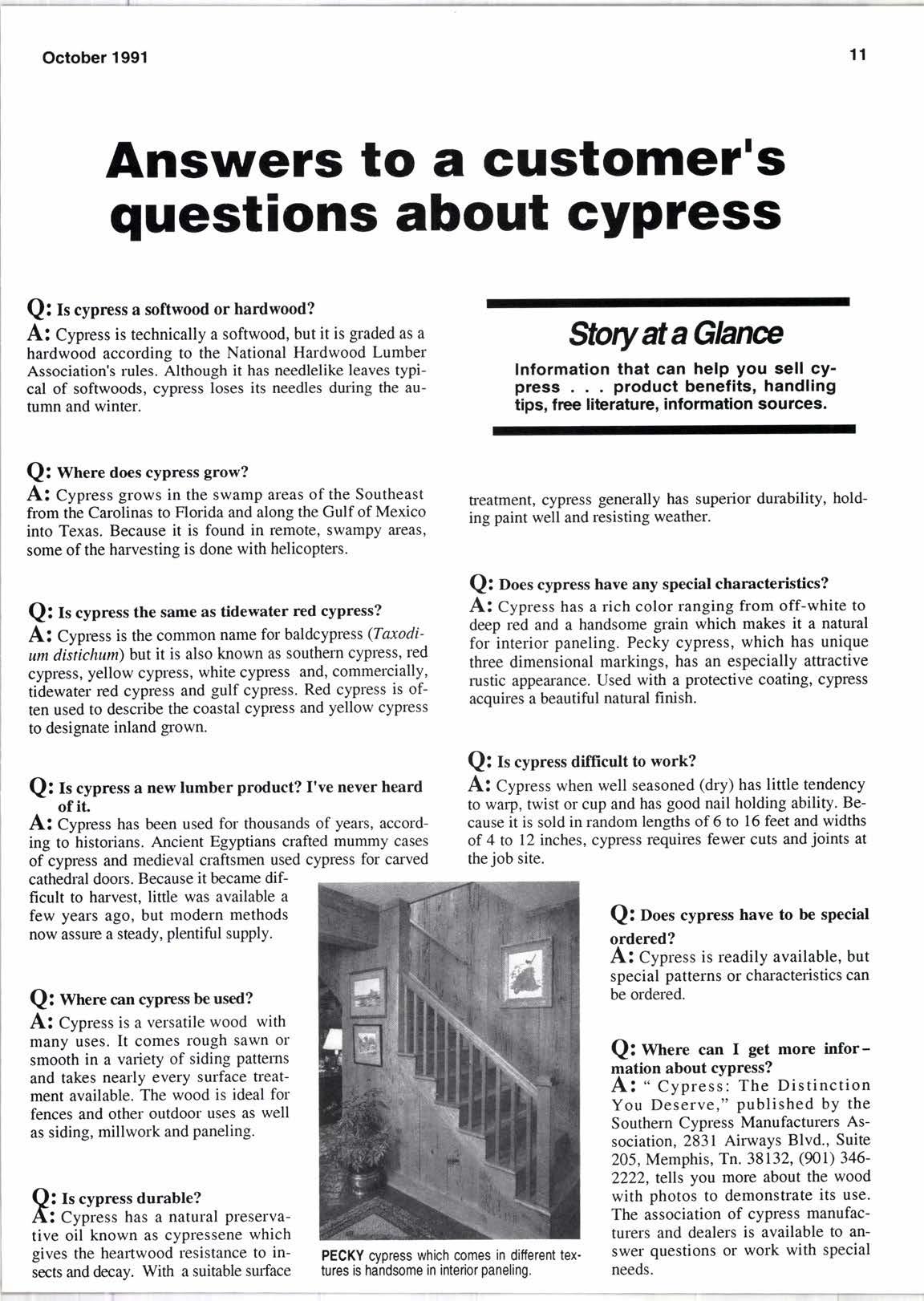
2 minute read
Answers to a customer's questions about cypress
Q: tr cyprcss a softwood or hardwood?
A: Cypress is technically a softwood, but it is graded as a hardwood according to the National Hardwood Lumber Association's rules. Although it has needlelike leaves typical of softwoods, cypress loses its needles during the autumn and winter.
Q: wttu." does cypress grow?
A: Cyp.ess grows in the swamp areas of the Southeast from the Carolinas to Florida and along the Gulf of Mexico into Texas. Because it is found in remote, swampy areas, some of the harvesting is done with helicopters.
Q: ts cyp.ess the same as tidewater red cypress?
A: Cypress is the common name for baldcypress (Taxodium disticlum) but it is also known as southern cypress, red cypress, yellow cypress, white cypress and, commercially, tidewater red cypress and gulf cypress. Red cypress is often used to describe the coastal cypress and yellow cypress to designate inland grown.
Q: Is "yp"ess a new lumber product? I've never heard of it
A: Cyptest has been used for thousands of years, according to historians. Ancient Egyptians crafted murnmy cases of cypress and medieval craftsmen used cypress for carved cathedral doors. Because it became difficult to harvest, little was available a few years ago, but modern methods now assure a steady, plentiful supply.
StoryataGlarre
Information that can help you sell cypress product benefits, handling tips, free libraturc, information sources.
treatment, cypress generally has superior durability, holding paint well and resisting weather.
Q: ooes cypress have any special characteristics?
A: Cypress has a rich color ranging from off-white to deep red and a handsome grain which makes it a natural for interior paneling. Pecky cypress, which has unique three dimensional markings, has an especially attractive rustic appearance. Used with a protective coating, cypress acquires a beautiful natural finish.
Q: Is cypr"ss dfficult to work?
A: Cyp."s when well seasoned (dry) has little tendency to warp, twist or cup and has good nail holding ability. Because it is sold in random lenglhs of 6 to 16 feet and widths of 4 to 12 inches, cypress requires fewer cuts andjoints at the job site.
Q: noes cypress have to be special ordered?
A: Cypress is readily available, but special patterns or characteristics can be ordered.
Q: where can cypress be used?
A: Cypress is a versatile wood with many uses. It comes rough sawn or smooth in a variety of siding pattems and takes nearly every surface treatment available. The wood is ideal for fences and other outdoor uses as well as siding, millwork and paneling.
Q: k cypress durable?
A: Cypress has a natural preservative oil known as cypressene which gives the heartwood resistance to insects and decay. With a suitable surface
Q: wrre.e can I get more information about cypress?
A: " Cypress: The Distinction You Deserve," published by the Southem Cypress Manufacturers Association, 2831 Airways Blvd., Suite 205, Memphis, Tn. 38132, (901) 3462222, tells you morc about the wood with photos to demonstrate its use. The association of cypress manufacturers and dealers is available to answer questions or work with special needs.










